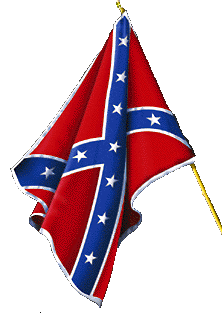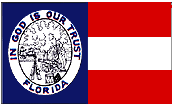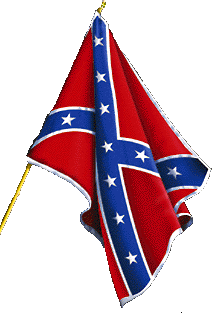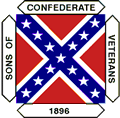







Pvt. William Riley Milton Camp 741
Sons of Confederate Veterans

Volume 10 Commander Terry Binkley Issue 3

![]()
Commander's Corner
Greetings Compatriots,
Congratulations to Camp 741 for the positive exposure of the annual George Washington Birthday Parade in Eustis on Feb. 26th! I want to extend a special note of thanks to 1st Lt. Commander Jim Binkley Jr. for his help on the day of the parade. Jim was in the grips of the nasty flu bug that is going around, yet in true Confederate spirit; he came down and rendered valuable assistance in getting the signs on the truck and hooking up the PA., that is DEDICATION! Also thanks to soon-to-be Compatriot Jim Baumgardener for marching under arms with Sgt.-At-Arms Eddie Hurst, myself, and 8th Brigade Commander Harry Hurst. We made a good impression on the multitude when we fired the muskets, I heard lots of squeals and oohs and ahs. Thanks also to Benevolence Officer Paul Mott and Mrs. Mott, Col. Wood, Adjutant Bill McClelland, Sharon Hurst, her daughter and granddaughter. Thanks to you all for turning out and letting people know that there are still some real Southerners left in Florida!
Our regular Camp meeting for April will be held on Tuesday, April 5th, 2005 at the 5th Street Charhouse. It is located at 114 S. 5th St. (hence, the name), in downtown Leesburg. If you are on Main St., you will need to go south 1 block over to Magnolia St., and then to 5th. You can’t miss the restaurant once you are on 5th St. I think it will be a good place to meet. We can try it and see how it goes.
April will be a busy month with several activities going on. The “Springtime Parade” in Tallahassee is on April 2nd, Camp 741 monthly meeting on April 5th, the Rodeheaver Boys Ranch Open House and BBQ will be on April 17th, and we will be presenting a donation of over $900 to them at that time, so plan to attend and help represent your camp. Our most sacred of duties, Confederate Memorial Day, will be held on April 23rd at the Glendale Cemetery in Umatilla. If you do not attend any other meeting or function this year, please attend this, this is one of the main reasons the SCV exists, to honor our forefathers who have bequeathed to us our glorious heritage. On April 30th, we have been invited to attend a headstone dedication by the John Hance Osteen Camp 770 in Bradford, Fl. I highly recommend attendance at any function put on by Camp 770 if for no other reason than the excellent food they always have! Not to mention, they have been some of Camp 741’s best friends and supporters. Mark your calendars and plan now to get out and support these activities, remember, “If not you…who? If not now…when?
Y.O.S.
Terry
"If I ever disown, repudiate or apologise for the cause for which Lee fought and Jackson died, let the lightenings from Heaven rend me and the scorn of all good men and true women be my portion. Sun, moon and stars all fall on me when I cease to love the Confederacy. 'Tis the cause, not the fate of the cause, that is glorious"-- Major R. E. Wilson, C.S.A.
![]()
Chaplain’s Chat Rev. Dun Gordy
Will Return Next Month! Here is one of Dun's great articles from last year. Our prayers are with Dun, Harriet and their families.
He Is Risen!
The missionary I was visiting in Venezuela was from Alabama so he knew how to plant a garden and his sweet wife knew just how to cook the black-eyed peas, okra, corn on the cob and a skillet of cornbread to go with the wild pork the Indians had brought in. We had just gotten started with this noon meal when there was a big commotion outside. When Cecil found out what it was about he jumped up from the table and instructed us “They’re doing it! Grab your camera and hurry”.
“Won’t it wait until after lunch?” I was hungry.
“No. They are about to start. Hurry up, let’s go,” he urged.
The insistence in his voice and the urgency of his manner prompted me to reluctantly leave the table, hurriedly grab my camera bag and follow him out the front door. We dropped in with the stream of near naked tribal men, women and children headed to the jungle just beyond the house. A short walk down a narrow jungle trail brought us to the large round shabono that was home to this band of about 100 or more people. We squeezed thru the narrow opening that had been made in the poles of the stockade-like wall.
The atmosphere was charged with tension. One of the men grabbed Cecil by the arm and pointed him to a spot on the edge of the big circular clearing. Others indicated with gruff instructions that we didn’t understand that Billy and I were go with him. The angry brandishing of their long bows and 6-foot poison tipped arrows didn’t leave any doubts where they wanted us to go.
“They don’t look too happy for us to be here” My apprehension was probably obvious. “Maybe we had better come back later,” I suggested.
“No. They said for us to come. They are just up tight and scared,” Cecil assured us.
The entire village from the oldest fierce warrior to the youngest child was weeping, wailing and some actually shivered with obvious fear. You could feel it as well as see the terror on their faces. An unappetizing mixture of banana mush was bubbling in a large pot hanging over the fire.
“What’s happening?” I whispered. And from then on we Cecil gave us a running commentary in hushed tones.
They were gathered to drink the bones of a dead person. The body had been cremated and the bones extracted from the smoldering ashes and pounded into a powdery substance. These remains had been stored in gourds for this “funeral”. One of the men dipped a bowl of the mush and shook out the powdered remains of his dead relative. After mixing it with his fingers he drank his share before passing it on to his kinsmen. His distaste for the ordeal was as obvious as his fear.
The weeping and wailing grew as the oppressive fear that gripped every person heightened. I still shudder when I remember helplessly watching this heart-rending ordeal. I tried to take pictures but was unable to focus the camera with such tears of agony blurring my vision. “Why?” I kept asking myself. As they reluctantly followed the custom of their ancestors they were terrorized with fear of the spirit of that dead person as well as the spirits that haunt every aspect of their lives. Cecil was able to explain it to me later.
They do not have an answer to the grave! They had no answer for death. They had not yet been told of the wonderful victory of Jesus’ resurrection from the dead.
What a blessed and precious comfort and assurance we have as we celebrate this Easter season and our Lord’s conquest of death and the grave. Let us not neglect the triumphant shout of praise for Who He is and what He has done. HE HAS RISEN!
Dun
![]()
Confederate Veteran
Rending The Commonwealth of Virginia
(The following paper, written by Miss Frances Garrett, winning in the high school contest at Wytheville, Virginia, was second in the contest sponsored by the Virginia Division U.D.C., the prize paper being published in the VETERAN for Sept.-Oct., pg. 333. The writer of this paper was an honor graduate of the high school at Wytheville and entered William and Mary College as a freshman before her sixteenth birthday. Both papers are very fine, and most deservedly both are given place in the VETERAN.)
The facts which deal with the cutting off of the western counties of Virginia and forming them into a new state are unknown to the average student of history. This is mainly due to the fact that many historians have allowed prejudice and partisanship to obscure the exact truths. The formation of the State of West Virginia was in itself an unconstitutional act, and Abraham Lincoln knew this when he signed the bill which admitted these counties as a new State. Although he claimed that he signed this bill as a war measure, it did not tend to serve his purpose in the prosecution of the War Between the States. Not only was this act unconstitutional, but it was not desired by more than a small minority of the people of the new State. It is true that sectionalism had prevailed in Virginia for many years prior to the War Between the States and that the most widely separated parts were entirely out of sympathy with each other. The mountain ranges were the natural divisions of the State. To the east lay old Virginia, a country of slaveholders and vast plantations; the west was largely divided into small farms and slaves were few. There had long been a difference of interest between the sections and a considerable political antagonism. The west, almost ever since the Revolution, had agitated for reform in the unequal system of representation which gave the east many more delegates in proportion to the white population than the west. In the Constitutional Convention of 1829-30, the question of representation held the chief place, but no satisfactory basis was decided upon, for the westerners wished to limit representation strictly to the white population. The Constitution adopted at this convention did not prove satisfactory, and meanwhile sectionalism grew. In 1850, another convention was held which arranged a compromise, giving control of the House of Delegates to the west on a basis of white representation, and the majority in the Senate to the east upon the basis of taxation. This arrangement, though opposed by many, lasted until the War Between the States. Virginia enjoyed a decade of quiet unprecedented in her history until the presidential election of 1860. The election of Abraham Lincoln to the presidency came as a bitter blow to Virginia and the South. When it became known that a “Black Republican” had been elected President, one whom the South considered her bitterest enemy, one who had hurled coercive threats at the South, denouncing the people of South Carolina as rebels and calling the people of Louisiana thieves, then events began to shape toward the separation from the Union. The Virginia convention, which had been elected for the purpose of considering the question of secession, after more than two months of debate, on April 17, 1861, passed the Ordinance of Secession. The vote was given as 88 to 55. Of the trans-Alleghany delegates, eleven went with the majority of the convention in favor of the ordinance, and five others later changed their vote to the affirmative. To state it in a another way, the representatives of twenty-one counties in what is now West Virginia cast their lot with the South, while the delegates from nineteen other counties remained firm to the last in their support of the Union cause. The delegates from the northwestern part of Virginia, who had voted against the Ordinance of Secession, immediately held a meeting at the Powhatan Hotel. Here the State of West Virginia may be said to have had its birth, for the course was decided upon of returning to their homes and calling for a convention, the ultimate object of which should be the formation of a new State out of the loyal (?) counties. As a result, Union meetings were held in all portions of the northwest. The tenor of all these meetings was loyalty to the Federal Government. The movement for a convention to be called had its inception at Clarksburg on April 22. Wheeling was chosen as the place, not because of its geographical location, but because it was the only town where there was an assured Union majority. The meeting was advertised to convene May 13, 1861. Only the northern counties were invited to this convention (a general invitation was not extended to the entire State). Accordingly delegates were appointed by counties, towns, villages, and neighborhoods. In many cases these appointments were irregular. A close analysis showed that more than one-third of the delegates were from around Wheeling. From the first day of the first loyal convention to the final act of admission of West Virginia into the Union, the leaders of this movement racked their brains in the attempt to justify their proceedings and make them harmonize with the Constitution of the United States. The General Assembly of Virginia alone had the legal power to summon a public convention; therefore the Wheeling conventions were illegal and disloyal. Owing to the irregularity of the appointment of delegates to the first Wheeling convention, the meeting soon adjourned. This convention, however, attracted a great deal of attention over all the country, so much that large newspapers sent special correspondents there. Their reports were conflicting and confusing. On one point they all agreed, and that was the Union sentiment in West Virginia was greatly exaggerated. Out of eleven militia companies in Wheeling, the United States recruiting officer had been able to persuade only two to enlist, and these refused to leave the city. Another convention assembled in June, composed mostly of State Senators and Members of the House of Delegates. Only twenty-seven counties of West Virginia were represented. How these delegates were elected remains a mystery. One fact stands out clearly, these elections were irregular, unconstitutional, and unjustifiable. This convention cleared the ground for the formation of the new State. The first resolution adopted condemned the Ordinance of Secession as null and void, and required all members to take the oath to support the Constitution of the United States. It was now decided to erect a new government in Virginia entirely independent of the regular State administration. Ordinances were passed expressing the right of a revolution and declaring vacant the State offices. New officers were elected by the convention. The governorship was given to Francis H. Pierpoint, of Marion County, who had taken an active part in organizing the movement. The new State administration called itself “The Restored Government of Virginia,” entirely ignoring the legal State government at Richmond. Vigorous action was now taken toward Confederates of this section, declaring their offices vacant and confiscating their property. On July 2, 1861, there assembled in Wheeling a nondescript body calling itself the Legislature of Virginia. No record of its proceedings has ever come to light, and only the vaguest information is obtainable regarding its actions. The Wheeling newspapers were strangely silent as to the doings of this rump legislature. Granville D. Hall, the great apologist for the whole movement, passes over the subject in a most summary fashion. John S. Carlyle and Waitman T. Willey were elected United States Senators. Judging from the number of votes cast, the entire number of Senators and Delegates never exceeded thirty-eight.
July 4, 1861, Congress assembled in special session. A discussion arose over the seating of Carlyle and Willey as Senators of Virginia. According to Lincoln’s announced policy, none of the Confederate States had seceded from the Union because secession was unconstitutional. That being the case, the government at Richmond was the only legal recognized government of the State, and this bogus government sitting at Wheeling had no lawful right to elect United States Senators. Furthermore, the Constitution required seventy-nine for a quorum in one house and twenty-six in the other. How could thirty-eight men constitute an assembly? Notwithstanding the above facts, Congress, backed by Lincoln, waived all constitutionality in the matter, and, with their usual bold inconsistency, voted to seat the two Senators from Wheeling, and thus recognized the “Reorganized Government” of Virginia.
The second Wheeling convention had adjourned to meet in August. An act was passed August 29, 1861 providing for a new State to be called “Kanawah” (sic). On account of much opposition, the name was later changed to West Virginia. At the same time an act was passed arranging for the election of delegates to form its constitution. When this constitution was submitted to a vote, it was adopted by 622 in favor as against 440 opposed. One-third of the affirmative votes were from the four northern counties, while the southern counties, which bordered on old Virginia, were silent. Thus the new State of West Virginia was established by means of a series of fraudulent elections backed up by the corrupt Lincoln administration.
At a session of the legislature of the reorganized government, held on December 2, 1861, sweeping measures were passed showing that the leaders were bent on completely dismembering the Old Dominion. They planned to have the counties of Northampton and Accomac annexed to Maryland. All of what is now Southwest Virginia would be incorporated in West Virginia. This included such counties as Craig, Giles, Bland, Tazewell, Russell, Lee, Scott, etc. Other counties were given an opportunity of voting on the question of annexation to the new State. Such counties were Botetourt, Bath, Alleghany, Shenandoah, Rockbridge, Augusta, etc. The counties of Berkley and Jefferson were deliberately stolen, and it is a known fact that the people from these two counties wished to remain in Virginia. After the war, when Virginia pressed her claim for these two counties in the United States Supreme Court, the Court upheld the act of Congress, and Virginia lost these two counties. It must be remembered, however, that Salmon P. Chase was Chief Justice of the Supreme Court at this time. It was he, who, as Lincoln’s Secretary of the Treasury, supported Lincoln when he signed the bill which admitted the new State to the Union. Virginia would be given the privilege of forming a State out of the remaining part of her old territory only when she would vote to ratify the constitution of West Virginia.
For a time Governor Pierpoint removed the seat of his government to Alexandria, Va. Most of the people of this section were in sympathy with the Southeren Confederacy and the regular State government at Richmond. The Pierpoint administration existed only in the shadow of the Federal armies and would have been immediately expelled but for the Lincoln administration and the protection afforded by the Federal Government.
The Pierpoint government was not founded on popular demand in Virginia, but was a revolutionary government and it was doomed to lose its hold on the people of the Old Dominion. The Constitution of the United States required that a State should give consent to the erection of a new State within its territory. The “Restored Government” used the name of Virginia to secure this desired vote. Thus those counties voted in the name of Virginia to form a new State. This was merely the consent of West Virginia to her own establishment, and Virginia had no hand whatever in the matter.
The Alexandrian government was not important. It governed but few counties and that at the point of bayonets. Men of intelligence at that time and since have smiled at its legitimate pretenses. Its chief interest lies in the fact that it was the nucleus of the Republican party in old Virginia and its measures which were adopted were characteristic of the reconstruction in Virginia. It will thus be seen that when Lee surrendered, a Union government existed in Virginia whose members were afterwards to become Republican leaders and radicals as well, as the Republican party grew in that direction.
Congress after much discussion and opposition passed the Bill of Admission for the new State, December 10, 1862. The members of the Senate admitted the unconstitutionality of the bill, but they justified themselves on different grounds. In signing the bill, Abraham Lincoln made a lengthy apology for his act and concluded by saying it was a war measure and would not furnish a disturbing element in time of peace.
(From November, 1932 Confederate Veteran Magazine)
Bibliography.
“The Disruption of Virginia,” by McGregor.
“The Political Reconstruction Of Virginia,” by H .J. Eckenridge.
“The South In The Building Of The Nation,” Vol. 1, Chap. 11.
“History Of West Virginia,” by Callahan.
“The Rending Of Virginia,” by Granville D. Hall
“History Of Virginia,” by R. L. Morton
![]()
"Remembrance Book"
This month’s ancestor, Jehu Givens was another Lake County pioneer. Jehu Givens was born in 1834 in Craig County, Virginia, to Daniel and Jemima Givens. On May 10, 1861, at the age of 27, Jehu enlisted as a Private in 2nd Company C, 28th Regiment, Virginia Infantry, CSA, known as the “Craig Mountain Boys” under Captains Michael P. Spessard and John W. Bowen. This enlistment was supposed to be for a period of one year. Jehu also served with the “Old Dominion Rifles”. On July 3, 1863, well past his one-year enlistment, Pvt. Givens was taken prisoner at the Battle of Gettysburg. The records then show Jehu being paroled at Point Lookout, Maryland on Feb. 18, 1865 and received at Boulwares and Cox Wharf on Feb. 20-21, for prisoner exchange, after one year and seven months as a prisoner of war. The incarceration at Point Lookout had taken a toll on Jehu. Being ill and unable to return to his command immediately, his journey toward home was delayed. When he was finally fit enough, he began his journey to return to his command. Before he could reach home, the War had closed. Jehu continued on to his home where he would begin a new life.
On Feb. 20th, 1867, Jehu Givens married Elizabeth J. Caldwell, the daughter of James T. and Adaline Caldwell, and began a new life with a new family. They were married by Minister C. C. Blankenship in Lee County, Virginia.
In late summer of 1912, the Givens’ decided to uproot their family from their farm in Virginia and move to warmer climes. By October 30, 1912, they had found their new home in Umatilla, Florida. This would be a big event in anyone’s life, especially if you were in your seventies as the Givens’ were. Yet they continued to prosper until, in January 19, 1921, Jehu returned to our Lord. Jehu Givens lived a long life, one where he turned his plowshare into a sword, then back into plowshare. Private Jehu Givens, formerly of 2nd Co. C., 28th Regt. Virginia Inf. CSA, now rests in Glendale Cemetery, Umatilla, Florida.
We Shall Not Forget!
![]()
Our Camp
History/News/Notes
NEWS: Remember, April 5th is our next scheduled meeting at a new location!!!
Meeting Location: 5th Street Charhouse in Leesburg, FL.
Located at 114 S. 5th St. between Magnolia and Main St. in downtown Leesburg. 6 P.M. Supper, 7 P.M. Call to Order. We are trying this new location to see if it will suit our needs a little better. Guests are always welcome!

Camp 741's Webpage is now archived and available on CD! The entire webpage for the years 2003 and 2004 are available including extra pictures not published on the web. This CD runs just like it was on the the internet without internet access. Get yours today! $5.00 for one, both for $7.00. Ask Terry or Jim.
DUES WERE DUE AUGUST 1st for 2004! $49 is a small price to pay to support the fight for our cause. Be sure to get yours in as soon as possible. After Nov. 1st it is $54. Life memberships are $500 for members 64 years and younger (5 payments of $100 paid off in 6 months), and, $250 for those members 65 and older.
